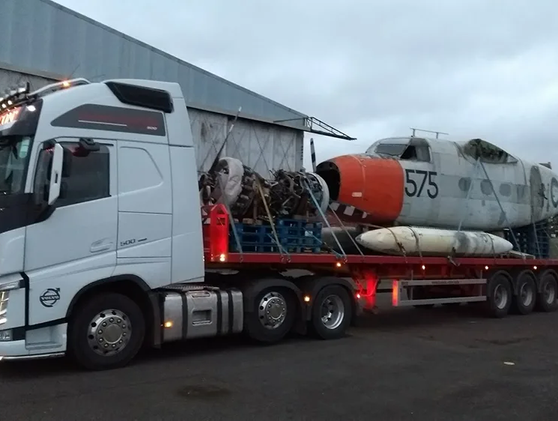> COLLECTION > AIRCRAFT > PROPELLER-DRIVEN > Percival Sea Prince
SEA PRINCE T.1

Image: MARK J. CAIRNS
The Percival Sea Prince WF122 transport aircraft, currently under intensive restoration at the Ulster Aviation Society, is a fascinating example of aviation history, and visitors to hangar 2 can witness this iconic aircraft up close.
Designed and manufactured in the United Kingdom in the 1950s as a versatile and reliable aircraft, the Sea Prince was primarily used for maritime patrol and transport duties.
Its sturdy construction and impressive range made it a reliable aircraft for coastal surveillance, anti-submarine warfare, and transportation of cargo and personnel. various transportation purposes. Its capabilities made it a valuable asset in both civilian and military operations.
Used extensively by the Royal Navy and the Royal Air Force, as well as by several other countries worldwide. Its versatile nature and impressive capabilities made it an excellent aircraft for a variety of missions.
It could fly for extended periods, providing a stable platform for surveillance and search and rescue operations. Equipped with advanced navigational systems and a reliable range, the aircraft was well-suited for locating and providing assistance to distressed vessels or individuals in remote areas.
The aircraft's robust design also made it a popular choice for transport missions, moving troops to remote locations with ease.

Image: MARK J. CAIRNS
The aircraft's versatility extended to its ability to carry various types of cargo, including equipment, supplies, and even vehicles. This made it an invaluable asset in supporting military operations and logistics.
The Sea Prince legacy extends beyond its military duties. In the commercial aviation sector, the aircraft was used by several airlines as a reliable workhorse.
Its spacious cabin and efficient operation made it a popular choice for cargo transport, with some airlines even modifying the aircraft to accommodate passengers.
As visitors explore the aircraft's features and learn about its impressive capabilities, they can appreciate the hard work and innovation that went into its design and construction.

Image: MARK J. CAIRNS
Overall, the Percival Sea Prince transport aircraft was a reliable and versatile workhorse in the field of aviation. Whether transporting passengers, cargo, or participating in search and rescue missions, this aircraft demonstrated its prowess and reliability.
WF122 is an integral part of aviation history, and its display at the Ulster Aviation Society provides an immersive experience for visitors.
Its presence at the UAS offers an opportunity to delve into the rich history of aviation and witness firsthand the technological advancements of its time and also to see the UAS' volunteer restoration team's passion and dedication.

Image: MARK J. CAIRNS

Image: MARK J. CAIRNS
Retrieving the Sea Prince WF122 from original home
History of our Sea Prince WF122
Percival P57 Sea Prince WF122 c/n P57/18
• Built 1951 Delivered to 744 SQN Eglinton 07/12/1951 to 13/03/1953
• 13/03/1953 to 28/06/1954 AHU Lossiemouth
• 28/06/1954 to 04/12/1956 750 Sqn RNAS Culdrose
• 04/12/1956 to 06/02/1957 RNAY Lee-on-Solent
• 06/02/1957 to 05/03/1957 750 Sqn RNAS Culdrose
• 05/03/1957 to 01/07/1958 AHU Lossiemouth Modernisation.
• 01/07/1958 to 13/10/1959 750 Sqn RNAS Culdrose
• 13/10/1959 to 20/10/1959 FOFT Command Flt Yeovilton
• 20/10/1959 to 01/02/1960 AHU Brawdy
• 01/02/1960 to 01/07/1960 Stn Flt Lossiemouth
• 01/07/1960 to 14/11/1961 700Z Flt Lossiemouth
• 14/11/1961 to 06/03/1962 AHU Brawdy
• 06/03/1962 to 14/08/1962 NARIU Lee-on-Solent. Conversion to ECM classroom.
• 14/08/1962 to 20/06/1966 831 Sqn Culdrose/Watton
• 20/06/1966 to 15/09/1966 NARIU Lee-on-Solent Removal ECM equipment
• 18/05/1967 to 16/11/1967 NASU Lossiemouth
• 16/11/1967 to 16/10/1968 Stn Flt Lossiemouth
• 02/06/1969 wheels up landing Lossiemouth. NASU Lossiemouth for repair 26/09/1969
• 26/09/1969 to 21/07/1970 Stn Flt Arbroath
• 21/07/1970 to 19/10/1972 RNAY Belfast. Stn hack Red Hand of Ulster insignia.
• 19/10/1972 ferry to 5 MU Kemble Dismantled by road to 71 MU then BAC Hurn For Respar 26/06/1973
• 26/06/1973 to 26/11/1973 750 Sqn Culdrose
•26/11/1973 to 07/03/1979 Ground school Culdrose
• 07/03/1979 Stored until 31/10/1982 retired by road to Cornwall Air Park, Helston.
• 12/02 sold dismantled by road to Aeroventure Doncaster arr 29/05/03
Manufacturer: Percival
Model: P.57 Sea Prince T.1
Registration: WF122
UAS Location: Hangar 2
UNDER RESTORATION
Maximum Speed: 229 mph at 22,000 ft
Cruise Speed: 183 mph
Engines: 2x Alvis Leonides 125 rated at 550hp
Service Ceiling: 22,000ft
Range: 894 miles
Length & Height: 46ft 4” x 16ft 1"
Wing Span: 56ft
Production: Prototype first flight 13th May 1948.
Developed into the P66 Pembroke for RAF 128.
Total constructed 75 across 9 variants, 13 countries. 41 Mk T.1 built
Operating Life: 1951 - 1979
UAS Team Leader:
Philip Erwin
Restoration Team over the years:
-
Alan Stretton
-
Andrew Gray
-
David Hart
-
Harry Blair
-
Richard Norris
-
Stephen Hand
-
Tommy Montgomery
-
Uel Stewart
-
Andrew Dunn
-
Conn Smyth
-
Craig Neill
-
David Mellon
-
Dawn Gilmore
-
Drew McGookin
-
Harold ?
-
Jonas Verner
-
Josh ?
-
Leo Tweedy
-
Paul Bryars
-
Peter McAlernon
-
Richard Waring
-
Ryan Kearns
-
Stephen Cunningham
Past team members: -
Clifford Megahay
-
Edgar England
-
Georgie Magee
-
John McIntyre
-
Kate Lenny
-
Lochlan McIntyre
Deceased team members: -
Brian Hagan (Deceased)
-
James Frazer (Deceased)
















